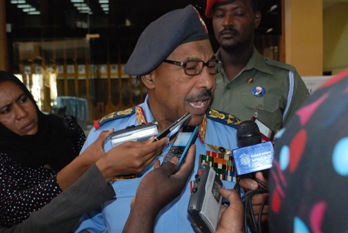Defense minister warns South Sudan that any attack in South Kordofan voids sealed deals
March 19, 2012 (KHARTOUM) – Sudan’s defense minister Abdel-Rahim Mohamed Hussein urged South Sudan to stop any support to the rebel groups operating in South Kordofan near the common borders saying that such action undermine the framework agreements signed last week.

Some hard-line religious groups along with a far right party denounced the deal and termed it as “betrayal” to the country and called on the Sudanese president Omer Hassan al-Bashir to scrap it as he had did with a framework agreement to resolve South Kordofan agreement in June 2011.
The Sudan Armed Forces (SAF) on Sunday accused Juba of providing fresh support to the rebels in their efforts to launch new attacks in South Kordofan and warned that this would prompt the army to consider that South Sudan violated the March 13th deals.
Speaking to the press at the National Assembly, Hussein said those agreements will be meaningless if the security issue is not solved. He also asked the South Sudan to stop its attacks on Sudan.
“If they launch these attacks that we warned against this will be considered a de facto abortion of the agreement,” the minister cautioned, echoing what the spokesperson said yesterday.
The minister stressed that the security arrangements dealing with the presence of rebel groups in South Sudan should be prioritized in Addis Ababa process adding “We are keen that the efforts done in Addis Ababa lead to establishment of security, peace, and stability in the border”.
The signing of the framework agreements came within the efforts of the African Union mediators to build confidence and common grounds between the two parties who failed to achieve any progress on the outstanding issues for almost two years.
The South Kordofan crisis marred the difficult talks between Khartoum and Juba on the post-independence issues particularly oil transit fees and Abyei’s ownership. South Sudan suspended its oil production in protest at Khartoum’s seizure of crude it said was to make up for unpaid transit fees.
The army was seen as the main driving force that pushed Bashir to break Sudan’s commitment to South Kordofan framework agreement signed last year. At the time the far-right Just Peace Forum (JPF) and its leader Tayeb Mustafa campaigned strongly against the deal.
(ST)
